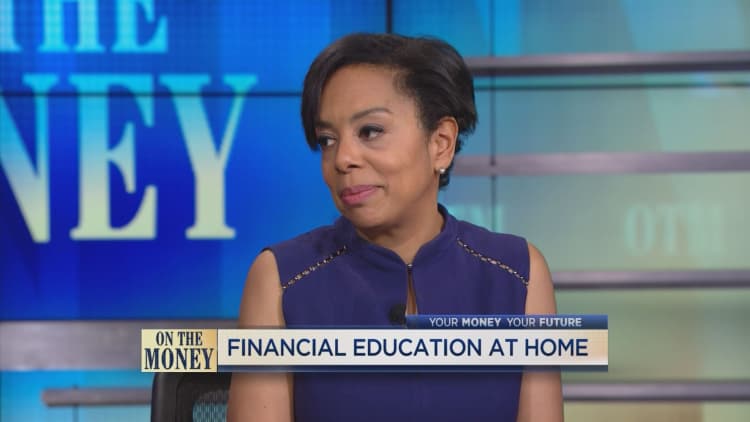Anthony Badillo, 32, graduated college with about $100,000 in student loan debt.
At first, he tried to live a similar lifestyle to his friends, even though he had an extra bill every month that they didn't have — loan repayment. After amassing $10,000 in credit card debt, Badillo reassessed his spending.
"Sometimes, I would stay in on the weekends, or sometimes I wouldn't go on the big trip," he said. "It takes time, understanding and a willingness to actually make the change."
After learning his financial lessons the hard way, Badillo has turned to helping others avoid his early mistakes. He became a certified financial planner at Gen Y Planning, an online planning firm that caters to people in their 20s and 30s.
For young people first entering the workforce, managing finances may seem daunting, but even in big cities across the U.S. where millennials are flocking and costs are high, it's far from impossible.
Here are some tips from financial experts and young workers about navigating their finances on their own for the first time.
1. Don't let food burn through your cash
Daily spending, especially in big cities, can add up quickly. When it comes to eating, find a balance between dining out and cooking at home.
If you are on a summer internship and living in a college dorm with a meal plan, take advantage of the dining hall, since you're already paying for the food.
One option is to dine out only on weekends. Alternatively, you can eat outside for lunch and cook for dinner, as suppers are typically more expensive at restaurants.
Meal prepping — cooking and packing your food ahead of time — can help you resist the urge to dine out, said Kori Clay, 22, who lives in New York.
"For inspiration, I go on Pinterest and look up easy meals to make on the go," Clay said.
For instance, breakfast burritos are simple to prepare in advance, she said. "It costs $20 to make, and now I'm set for breakfast for the next two weeks," Clay said.
2. Don't spend a paycheck you haven't received yet
James Bender, 22, who has lived in New York for about nine months and works for HBO as an account assistant, said he looks for free events to save money. Some venues offer free admission if you RSVP or enter before a certain time. Besides networking to find out about goings on, he uses Eventbrite, a site which allows you to filter for free happenings near you.
Bender also said you should make plans with money you have now, not money you expect to earn from a future paycheck.
"Don't think about the check that you will receive," Bender said. "If you do that, then you basically think of ways to spend your money before you even have it."
3. Set short- and long-term goals
The first concrete step in any financial plan is creating short-term and long-term goals, said Jim Marrocco, a financial planner and founder of Thinking Big Financial in New York. Then, design steps for how to reach them.
"It's really about breaking them down," Marrocco said. "Sometimes, I find you set these big goals but then you get lost because you have no idea how to get there."

Young workers should evaluate their objectives and their progress at least once a year, said David Poole, head of Merrill Edge Advisory, client services and digital capabilities.
Major life milestones, including marriage and children, may warrant a second look at your financial goals, too.
4. Adopt the 50-30-20 rule for managing income
Badillo at Gen Y Planning recommends the 50-30-20 rule for managing income: 50 percent should go toward needs, for example, rent; 30 percent toward savings and debt; and the remaining 20 for wants and discretionary spending.
Consider having the savings portion of your paycheck automatically deposited into a savings account to establish good habits, said Marrocco at Thinking Big Financial. Be realistic with your savings. Don't compromise paying other bills, and remember to adjust as your income increases.
Even if you aren't wealthy, meeting with a financial planner isn't a bad idea, Marrocco said. "Planning is not just for people who have money," he said.
Look for fee-only financial planning firms dedicated to younger people. XY Planning Network offers a list of planners who work with millennial clients.
5. Track your spending; even consider a pen and paper
A common mistake to avoid is being unaware of what you're spending, said Poole of Merrill Edge Advisory. Take a look at your expenditures and see where you can make cuts.
Download your bank's mobile app, and check it frequently to stay accountable and prevent overdrafts.
Apps such as Mint and Personal Capital are good for budgeting and investing, and Digit is a helpful savings strategy app, said Badillo at Gen Y Planning. Digit, which charges $2.99 per month, tracks users' spending and accounts, saving leftover cash.
The old-fashioned pen and paper method works, too.
"The process of writing down as you spend is cumbersome, but it actually helps you to understand what your behaviors are," Badillo said.
More from Personal Finance:

